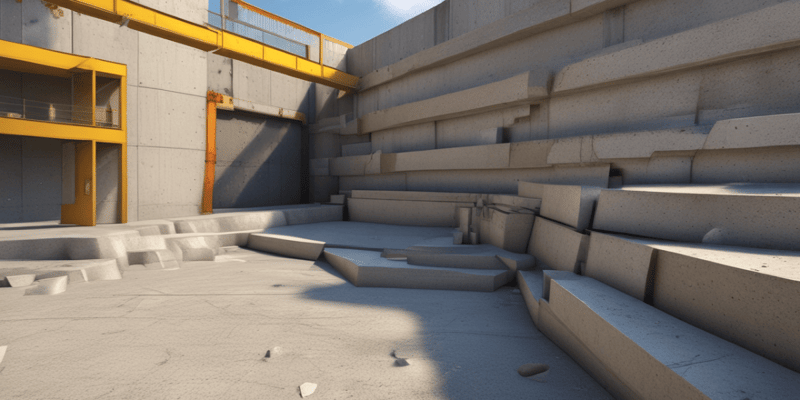16 Questions
What is the maximum aggregate crushing value allowed for the bituminous wearing surface of a road?
30%
Which type of concrete uses aggregates that weigh less than 1,100 kg/m3?
Lightweight concrete
What does ACV stand for in the context of aggregates' strength?
Aggregate Crushing Value
What does the aggregate impact value measure?
Resistance to impact load
Which type of road construction requires aggregates tough enough to sustain impact loads?
Surface course
What is indicative of an aggregate's resistance to wear, abrasion, and attrition?
Hardness
What is the maximum aggregate impact value for bituminous road surfaces?
30%
What are the two main uses of aggregates in Civil Engineering?
As an underlying material for foundations and pavements, as ingredients in Portland cement and asphalt concretes
What is the fundamental component in the construction of concrete structures?
Aggregate
What is the main difference between aggregate and cement functions in concrete construction?
Cement acts as jointing material, while aggregate is the composition material
Which of the following materials is NOT typically included in aggregates?
Water
What is the purpose of the cement in a concrete structure?
To bind different types and sizes of aggregate together
Which component makes up the actual mass of a concrete structure?
Aggregate
In Civil Engineering, what does the term 'aggregate' refer to?
A mass of crushed stone, gravel, sand, etc., predominantly composed of individual particles
What does the cement do in a concrete structure?
Binds different sizes and types of aggregate together
What is the primary function of cement in concrete construction?
To bind different types and sizes of aggregate together
Study Notes
- Rounded aggregates are natural aggregates that have minimum voids (32-33%), require less water for lubrication, and need less cement for a given water-cement ratio. They are not suitable for high-strength concrete due to poor interlocking.
- Irregular aggregates are shaped by attrition but not fully rounded, have higher voids (35-37%), and give lesser workability than rounded aggregates. They have better interlocking but are not ideal for high-strength concrete.
- Angular aggregates, used for higher strength concrete, come in the form of crushed rock and stone. They have the maximum voids (38-45%) and can be offset by filling voids with smaller aggregates.
- Aggregates make up 60-75% of concrete volume, providing strength, durability, and workability. Different types, like coarse gravel and fine sand, are used based on desired properties.
- Aggregates are also used in construction for drainage, pipe bedding, hard surfaces, water filtration, and sewage treatment processes.
- Aggregate properties, including size, shape, specific gravity, strength (aggregate crushing value, toughness, hardness), and moisture content, significantly impact concrete properties.
- Proper handling and storing of aggregates are crucial to prevent segregation, contamination, and ensure uniform moisture content for consistent concrete properties.
Learn about how the type, size, shape, and texture of aggregate can influence the strength and workability of concrete in both fresh and hardened forms. Understand why factors like weight of trains, train speed, and geology play a role in choosing the right aggregate for concrete.
Make Your Own Quizzes and Flashcards
Convert your notes into interactive study material.




